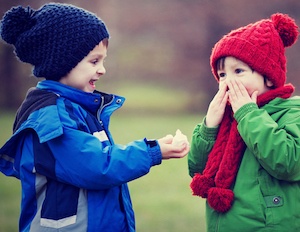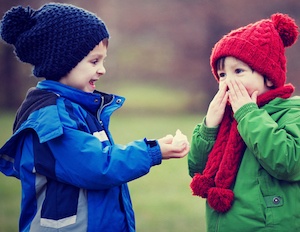
Decreasing the risk of spreading germs for preschoolers is easier said than done.
That's because children like to understand their world, having a natural sense of curiosity. So, if you tell your children not to spread germs, they will likely want to know what germs are, and why it’s bad to share them with other people. After all, the message usually given to children is that it’s good to share!
KidsHealth.org offers suggestions about how to explain the concept of germs in age-appropriate ways. Germs are, the article says, “small and sneaky” as “they creep into our bodies without being noticed.” We don’t typically know what germs we have until one or more of them causes symptoms: perhaps sniffles, fevers, coughing, or vomiting. Germs can lower people’s energy, too, making them feel tired.
Ways that germs can spread, the National Library of Medicine explains, includes touching someone who has germs—through hugging and kissing, for example—or by breathing in the air after someone coughs or sneezes. You can also “catch” germs by touching surfaces and objects with germs on them, and then touching your own nose, mouth, or eyes. Germs can also spread by animal bites or when changing a baby’s diaper, among other possibilities.
When You Come In Contact With Germs
Here’s how you might explain the process to your children:
Doctors can run tests to try to find out what germs are bothering you and give advice on what to do—maybe to take medicine, drink water, and get rest—but it’s even better if you don’t get sick in the first place. To protect your family and friends, then, you don’t want to share any germs you have or catch any that they have.
How to Prevent Germs from Spreading
WebMD.com offers suggestions on what to teach your children. First, show your children how to wash their hands with soap and running water, scrubbing well for twenty seconds or more. One healthcare system suggests a couple of songs to occupy your children as they scrub:
- Wash, wash, wash your hands, make them nice and clean
- If you’re happy and you know it, wash your hands
Handwashing should happen before eating, after touching pets, and after playing outdoors or in any other situation where germs might spread. Adults will have to explain when a new situation could spread germs instead of assuming that a youngster would already know that.
Also, teach your children how to cover their noses and mouths after coughing or sneezing. This can involve using a tissue (throwing used ones away!) or coughing/sneezing into their elbows. Afterward, wash their hands.
Another healthcare system recommends encouraging your children to stay away from people who are sick. Again, this may not be obvious to them while they’re still learning how germs spread. Plus, let your children know that they shouldn’t share a cup or eating utensil with anyone—even if that person doesn’t seem to be sick.
Stop Spreading Germs Without Soap and Water
If there’s no soap and water, the U.S. Food and Drug Administration says that hand sanitizer containing at least 60 percent alcohol is a backup plan. Hand sanitizers are not as effective as soap and water, but they do get rid of some germs. Once your children can wash their hands with soap and water, have them do so.
Looking for more ways to enrich your child’s learning and life? Horizon Education Center provides affordable quality care, including educational and enrichment opportunities for children in the following Northeast Ohio locations.









